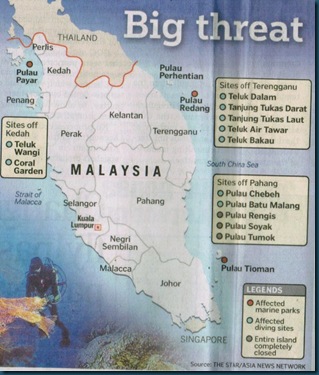 Underwater phenomenon: Coral bleaching takes place when the temperature of the sea increases due to global warming.
Underwater phenomenon: Coral bleaching takes place when the temperature of the sea increases due to global warming.Twelve out of the 83 sites around the popular islands of Perhentian, Rendang and Tioman in the east and Payar in the West are expected to be closed from late July 2010 till October 31, 2010. This is so to enable the corals to have sufficient time to recover and not be subjected to any disturbances from boats, divers and snorkelers. These areas see around 500,000 tourists arrivals on an annual basis, with a significant proportion of them being Singaporeans.
Authorities in Malaysia feared the loss of its rich marine life and the concomitant loss of tourists if the corals die. Hence, it hopes that the conditions of the corals would at least improve in view of the temporal closure of these sites. Tourists are still able to dive at other sites such as the islands off Terengganu, Pahang and Kedah, thus tourism would be not be as badly affected.

Water temperatures in the affected areas have risen to around 30 to 30 degree Celsius in recent months, an increase of up to 2 degree Celsius from the normal temperatures. Malaysian corals were previously threatened by escalating sea water temperatures in 1998 and 2006 and the situation was less severe as compared to the present where the sites are closed.
Besides promoting tourism as an engine of growth, it is important to maintain it at a sustainable level as divers tend to dredge sand from the seabed, causing them to settle on corals and aggravating the damages to the corals due to rising water temperatures. This would cause pressure to the corals as they can only grow well in pristine, clear waters.
Recovery from bleaching would depend on several factors which include the time period in which the sea temperatures remain elevated and the extent of sedimentation of the waters.
References:
- http://thestar.com.my/news/story.asp?file=/2010/7/22/nation/6713555&sec=nation
- http://www.telegraph.co.uk/earth/environment/globalwarming/7904497/Malaysia-closes-diving-reefs-to-save-coral.html
- The Straits Times (July 23, 2010). 'Malaysia closes dive spots to save corals'.